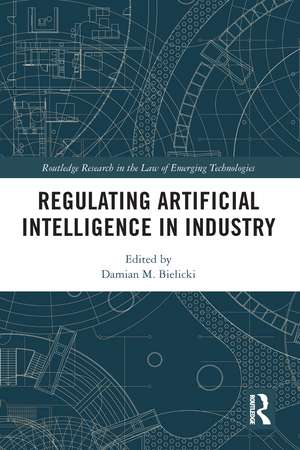Regulating Artificial Intelligence in Industry: Routledge Research in the Law of Emerging Technologies
Editat de Damian M. Bielickien Limba Engleză Paperback – 29 ian 2024
Offering a unique focus on current practice and existing trends in a wide range of industries where AI plays an increasingly important role, the work contains legal and technical analysis performed by 15 researchers and practitioners from different institutions around the world to provide an overview of how AI is being used and regulated across a wide range of sectors, including aviation, energy, government, healthcare, legal, maritime, military, music, and others. It addresses the broad range of aspects, including privacy, liability, transparency, justice, and others, from the perspective of different jurisdictions.
Including a discussion of the role of AI in industry during the Covid-19 pandemic, the chapters also offer a set of recommendations for optimal regulatory interventions. Therefore, this book will be of interest to academics, students and practitioners interested in technological and regulatory aspects of AI.
| Toate formatele și edițiile | Preț | Express |
|---|---|---|
| Paperback (1) | 310.47 lei 3-5 săpt. | +19.20 lei 5-11 zile |
| Taylor & Francis – 29 ian 2024 | 310.47 lei 3-5 săpt. | +19.20 lei 5-11 zile |
| Hardback (1) | 1003.12 lei 6-8 săpt. | |
| Taylor & Francis – 24 dec 2021 | 1003.12 lei 6-8 săpt. |
Preț: 310.47 lei
Nou
Puncte Express: 466
Preț estimativ în valută:
59.41€ • 62.18$ • 49.45£
59.41€ • 62.18$ • 49.45£
Carte disponibilă
Livrare economică 10-24 martie
Livrare express 22-28 februarie pentru 29.19 lei
Preluare comenzi: 021 569.72.76
Specificații
ISBN-13: 9781032159652
ISBN-10: 1032159650
Pagini: 254
Dimensiuni: 156 x 234 x 22 mm
Greutate: 0.36 kg
Ediția:1
Editura: Taylor & Francis
Colecția Routledge
Seria Routledge Research in the Law of Emerging Technologies
Locul publicării:Oxford, United Kingdom
ISBN-10: 1032159650
Pagini: 254
Dimensiuni: 156 x 234 x 22 mm
Greutate: 0.36 kg
Ediția:1
Editura: Taylor & Francis
Colecția Routledge
Seria Routledge Research in the Law of Emerging Technologies
Locul publicării:Oxford, United Kingdom
Public țintă
PostgraduateCuprins
PART 1: Horizontal AI Applications 1) Artificial Intelligence and its Regulation in the European Union 2) The Impact of Facial Recognition Technology empowered by Artificial Intelligence on the Right to Privacy 3) The Malicious Use of Artificial Intelligence against Government and Political Institutions in the Psychological Area 4) Leveraging Artificial Intelligence in Citizenship by Investment Programmes 5) Artificial Intelligence Application in Advance Healthcare Decision-Making: Potentials, Challenges and Regulatory Safeguards 6) Artificial Intelligence in the Legal Profession PART 2: Vertical AI Applications 7) Artificial Intelligence: An Earthquake in Copyright Protection of the Digital Music 8) Artificial Intelligence and Risk Preparedness in the Aviation Industry 9) Autonomous AI, Smart Seaports and Supply Chain Management: Challenges and Risks 10) Artificial Intelligence and Climate-Energy Policies of the EU and Japan 11) The Regulation of Militarised Artificial Intelligence: Protecting Civilians through Legal Reviews of New Weapons and Precautions 12) The Use of Artificial Intelligence in armed conflicts – implications for state responsibility 13) The Problematisation of Human Control over Lethal Autonomous Weapons: A Case Study of the U.S. Department of State Summary
Notă biografică
Dr Damian M. Bielicki is a Lecturer in Law and Director of the Law & Technology Research Group at Kingston University London. He is also a lecturer in Space Law and Cyber Law at Birkbeck University of London. He is a Senior Fellow of the Higher Education Academy, a member of the International Law Association, and a member of the International Institute of Space Law.
Descriere
Artificial Intelligence has augmented human activities and unlocked opportunities for many sectors. As with most advancing technologies, law is often playing catch up so the study of how law interacts with AI is more critical now than ever. This book provides a detailed qualitative exploration into regulatory aspects of AI in industry.















